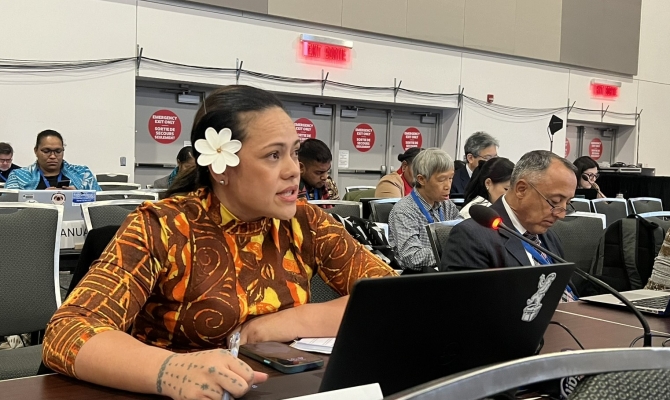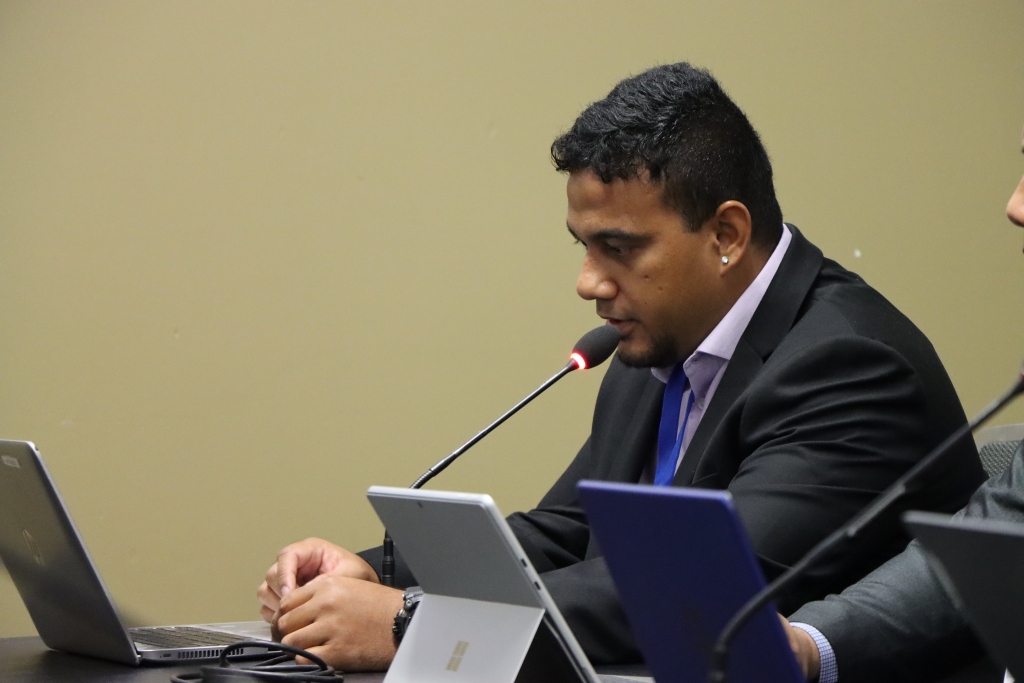
26 April 2024, Ottawa Canada - The plastics treaty needs to include legally binding obligations that cover the full lifecycle of plastics including addressing legacy plastic already in the marine environment.
The point was raised by Samoa, as the Chair of AOSIS, during contact group discussions on the revised zero draft of the plastics treaty on Day 4 of the fourth session of the Intergovernmental Negotiating Committee to develop an international legally binding instrument on plastic pollution, including in the marine environment (INC-4) underway at the Shaw Centre, Ottawa Canada, from 23 to 29 April 2024.
It is estimated that more than 171 trillion pieces of plastic are floating in the world's oceans, this could nearly triple by 2040 if no action is taken.
Ms Katenia Rasch, of Samoa, who delivered the statement, said for Small Island Developing States (SIDS), the instrument must include a mechanism for the remediation of existing plastic pollution in the marine environment, including in areas beyond national jurisdiction which was the original impetus for INC.
“This section must include legally binding obligations, which respect national circumstances and capabilities, to take actions to remediate or support remediation of existing plastic pollution, particularly in the marine environment. Relatively soft obligations to just cooperate will not solve the scourge of plastic pollution in our oceans,” Ms Rasch said.
“It is important that SIDS should not be disproportionately burdened by remediation activities, given that we are already disproportionately impacted by transboundary plastic pollution. Language on innovation and technology development for remediation could also be useful in this section,” she said.
Huge accumulations of floating legacy plastics, such as the Great Pacific Garbage Patch, the largest accumulation of floating plastic on Earth, lies in international waters, beyond national jurisdiction. This means no country currently has the responsibility to clean it up.
“As large ocean states, we are recipients of plastic products in the form of transboundary plastic waste. The Pacific is home to both the North and South plastic gyros, and fighting plastic on two fronts: domestic terrestrial waste, and foreign marine plastic pollution,” said Mr Penivao Moealofa of Tuvalu, while speaking on behalf of Pacific SIDS.
“As SIDS, it is already a challenge to manage our plastic waste, and is an injustice to us to continue to manage others’ plastic waste, especially when we contribute to less than 1.3% of the total plastic problem,” he added.

The special circumstances of SIDS refer to two linked concepts: the geographic and economic characteristics of small island developing states, and the legal principle that recognizes capacity constraints as a result of the physical characteristics.
SIDS face specific challenges due to their unique geographic characteristics, such as remoteness, limited landmass, small populations, small domestic markets, and limited natural resources. They are also highly exposed and vulnerable to external environmental and economic shocks, especially climate change and disasters. These challenges have been recognized in consensus documents adopted at the United Nations General Assembly and elsewhere.
The fourth Intergovernmental Negotiating Committee to develop an international legally binding instrument on plastic pollution, including in the marine environment is taking place in Ottawa, Canada, from 23-29 April 2024.
The Pacific Islands are represented by the Cook Islands, Federated States of Micronesia, Fiji, Kiribati, Marshall Islands, Nauru, Niue, Palau, Papua New Guinea, Samoa, Solomon Islands, Tonga, Tuvalu and Vanuatu through the support of the Government of Australia and the United Nations.
They are supported by the Secretariat of the Pacific Regional Environment Programme (SPREP), working with partners the Pacific Islands Forum Secretariat (PIFS), Office of the Pacific Ocean Commissioner (OPOC), The Pacific Community (SPC), Forum Fisheries Agency (FFA), Environmental Investigation Agency (EIA), Centre for International Environmental Law (CIEL), University of Wollongong, WWF and Massey University.
For more information visit: https://www.unep.org/inc-plastic-pollution/session-4